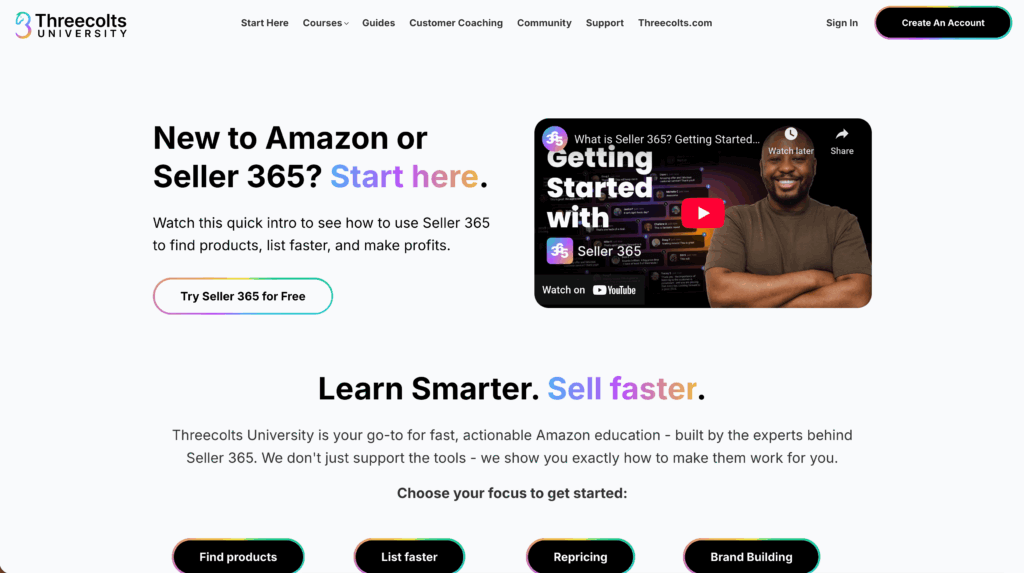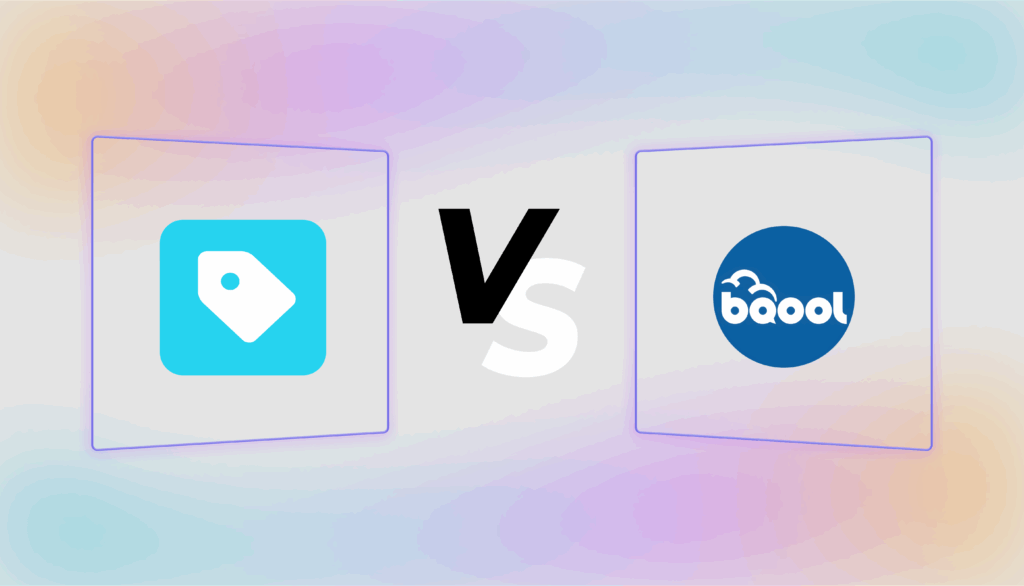- Blog
-
For Sellers
What are Amazon FBA courses & how to choose the right one?
Choosing the right Amazon FBA course could save you thousands in mistakes.

Looking to start selling on Amazon but feeling overwhelmed by the complexity? You’re not alone. Amazon FBA (Fulfillment by Amazon) has created opportunities for millions of entrepreneurs, but success requires knowledge that goes far beyond “find product, list product, make money.”
An Amazon FBA course provides structured education on building a profitable Amazon business. From product research and supplier negotiation to inventory management and PPC advertising, quality courses teach the systems and strategies that separate successful sellers from those who struggle.
The challenge lies in choosing the right course. With hundreds of options ranging from free YouTube videos to $5,000 masterclasses, how do you know which will actually help you build a sustainable business?
Let’s break down what makes an effective Amazon FBA course and explore your options.
What exactly is an Amazon FBA course?
An Amazon FBA course is educational content designed to teach aspiring and existing sellers how to build successful businesses on Amazon’s marketplace using their Fulfillment by Amazon service.
These courses typically cover the core components of Amazon selling: product research, supplier sourcing, listing optimization, inventory management, advertising strategies, and scaling techniques. The depth and quality vary dramatically between providers.
Most courses follow a structured curriculum that takes students from absolute beginner to operational seller. Some focus on specific selling models like private label, retail arbitrage, or wholesale, while others provide broader foundational knowledge.
The delivery format ranges from self-paced video modules to live coaching sessions, private communities, and one-on-one mentoring. Premium courses often include software tools, supplier databases, and ongoing support.
Why consider taking an Amazon FBA course?
Amazon’s platform complexity has grown exponentially. What worked five years ago might violate today’s policies, and strategies that generate profits in one category might fail in another.
Self-taught sellers often waste months on outdated information or learn expensive lessons through trial and error. A quality course condenses years of experience into actionable frameworks, helping you avoid common pitfalls that cost time and money.
Structured learning also provides accountability and community. Many successful sellers credit peer connections and mentorship as crucial factors in their growth.
The time investment in education typically pays dividends through faster launches, better product selections, and more profitable operations from day one.
Key components of effective Amazon FBA courses
1. Comprehensive product research training
Strong courses teach multiple product research methodologies, not just one approach. Students learn to analyze demand patterns, competition levels, profit margins, and market trends using both free and paid tools.
The best courses go beyond basic criteria like sales rank and review counts. They teach seasonal analysis, patent research, trademark searches, and how to identify products with long-term potential rather than short-term trends.
2. Supplier sourcing and negotiation
Finding reliable suppliers separates successful sellers from those stuck with quality issues and inventory problems. Quality courses provide frameworks for evaluating manufacturers, negotiating terms, managing quality control, and building lasting relationships.
This includes understanding MOQs (minimum order quantities), payment terms, shipping arrangements, and how to protect yourself legally in international transactions.
3. Listing optimization and SEO
Amazon is fundamentally a search engine. Courses should teach keyword research, title optimization, bullet point construction, and how to create compelling product descriptions that convert browsers into buyers.
Advanced courses cover A+ content creation, image optimization, and how to structure listings for maximum visibility in Amazon’s algorithm.
4. PPC advertising strategies
Organic rankings take time to develop. Effective courses teach Amazon PPC fundamentals, campaign structures, keyword strategies, and how to achieve profitability with sponsored ads.
This includes understanding match types, bid strategies, negative keywords, and how to scale advertising profitably as your business grows.
5. Inventory and financial management
Running out of stock kills momentum and rankings. Quality courses teach demand forecasting, inventory planning, cash flow management, and how to scale inventory investment as sales grow.
This includes understanding Amazon’s storage fees, seasonal fluctuations, and how to manage working capital efficiently.
Red flags when evaluating FBA courses
- Unrealistic income promises: Courses promising “six figures in six months” or showcasing income screenshots without context should raise immediate concerns. Legitimate courses discuss both successes and failures, emphasizing that results depend on execution, market conditions, and individual circumstances.
- Outdated strategies: Amazon’s policies and marketplace dynamics change constantly. Courses teaching strategies from 2018 might contain information that’s no longer effective or could violate current terms of service. Check when content was last updated and whether instructors actively sell on the platform today.
- Lack of ongoing support: Amazon selling involves constant problem-solving. One-time courses without communities, updates, or support systems leave students stranded when they encounter challenges not covered in the original curriculum.
- Hidden costs and upsells: Some courses advertise low entry prices but require expensive software subscriptions, mentoring upgrades, or “mastermind” access to get complete information. Evaluate total costs upfront.
- No refund policy: Reputable course creators stand behind their content with reasonable refund policies. Those refusing refunds often indicate low-quality or incomplete training.
Free alternatives: Threecolts University

Before investing thousands in premium courses, consider starting with comprehensive free resources. Threecolts University offers extensive Amazon selling education at no cost, built by ecommerce veterans and the experts behind Seller 365.
The curriculum spans everything from beginner tracks to advanced strategies. New sellers can start with foundational courses for finding your first winning product or listing faster, while experienced sellers can tackle advanced topics like inventory accounting and brand building.
What makes this platform unique is its focus on practical, tool-based education. Rather than theoretical concepts, courses show you exactly how to use proven solutions like ScoutIQ, Tactical Arbitrage, and other professional-grade tools to find products, optimize listings, and manage inventory.
Courses include interactive elements like quizzes, hands-on exercises, and certificates of completion. The focus areas include all the core competencies needed for Amazon success.
The best part? There’s no catch. Access is completely free regardless of whether you use any Threecolts tools or services.
How to maximize your FBA education investment
Start with free resources
Begin with comprehensive free education like Threecolts University before investing in premium courses. This helps you understand your learning style, identify knowledge gaps, and make informed decisions about paid education.
Focus on current information
Prioritize courses updated within the last year. Amazon’s platform evolves rapidly, and strategies that worked 18 months ago might be ineffective or policy violations today.
Verify instructor credibility
Look for instructors who are experts on everything Amazon and can demonstrate current success. Ask for recent case studies, not screenshots from years past.
Plan for ongoing learning
Amazon success requires continuous education. Factor ongoing training costs into your business budget rather than viewing education as a one-time expense.
Join communities
Connecting with other sellers provides ongoing support, problem-solving assistance, and partnership opportunities that extend far beyond initial training. For example, there are Facebook groups and Discord servers out there dedicated to Amazon selling communities.
Build your Amazon strategy smarter
The most successful sellers combine multiple learning sources rather than relying on single courses. Free resources like Threecolts University provide solid foundations, while specialized paid training can address specific challenges as they arise.
Start with fundamentals, validate your interest and aptitude, then invest in advanced training that aligns with your chosen selling model and business goals.
Remember that education without action creates knowledge without results. Apply what you learn immediately, even if it means starting small or making mistakes along the way.
The Amazon marketplace rewards those who combine solid education with persistent execution. Choose your learning path carefully, but don’t let analysis paralysis prevent you from taking that crucial first step.
Ready to start your Amazon FBA education? Explore Threecolts University and begin building the knowledge foundation for your Amazon business—completely free, with courses designed by working professionals who understand what it takes to succeed.






















